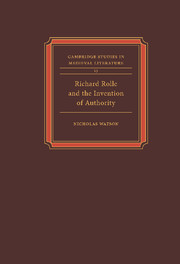Book contents
- Frontmatter
- Contents
- Preface
- List of abbreviations
- Introduction: Contexts: three preliminary essays
- PART I
- PART II
- 3 Active life: Judica Me as apologetic pastoral
- 4 Contemplative life, ‘Seeing into Heaven’: commentaries and Canticum Amoris
- PART III
- PART IV
- Epilogue: Rolle as a late medieval Auctor
- Excursus I: The chronology of Rolle's writings
- Excursus II: Rolle's reading and the reliability of the Officium
- Notes
- Bibliography
- Index
3 - Active life: Judica Me as apologetic pastoral
Published online by Cambridge University Press: 04 December 2009
- Frontmatter
- Contents
- Preface
- List of abbreviations
- Introduction: Contexts: three preliminary essays
- PART I
- PART II
- 3 Active life: Judica Me as apologetic pastoral
- 4 Contemplative life, ‘Seeing into Heaven’: commentaries and Canticum Amoris
- PART III
- PART IV
- Epilogue: Rolle as a late medieval Auctor
- Excursus I: The chronology of Rolle's writings
- Excursus II: Rolle's reading and the reliability of the Officium
- Notes
- Bibliography
- Index
Summary
The first part of this study has looked at Rolle's career as a whole from several perspectives, in an attempt to arrive at some working definitions. The following analysis of Judica Me initiates a series of chapters which look individually, in more or less detail, at all of his works (except the Latin Psalter). Few have been explicated with care, and most are seldom read; these analyses thus have to start from scratch, beginning with generalized descriptions, and supporting findings with frequent quotations. Yet the main purpose of these chapters is not so much with explication as with the development of an overarching account of his writing career: an account which can be subdivided into three closely related themes. The first theme concerns the relationship between apology and didacticism – which must not be thought of as mutually exclusive entities, but rather as literary impulses which may or may not conflict. Apology emerges only gradually out of the didacticism of the early works, but becomes the dominant strain in his middle period before rejoining forces with Rolle's didactic impulses in such late works as Emendatio Vitae and Super Lectiones Mortuorum. The second theme concerns the progressive articulation of the structure of ideas I described in the previous chapter: a structure which responds well to Rolle's apologetic needs (and is clearly a product of them), but which can also be employed in the generalized pastoral writing characteristic of the late works.
- Type
- Chapter
- Information
- Richard Rolle and the Invention of Authority , pp. 75 - 95Publisher: Cambridge University PressPrint publication year: 1991



